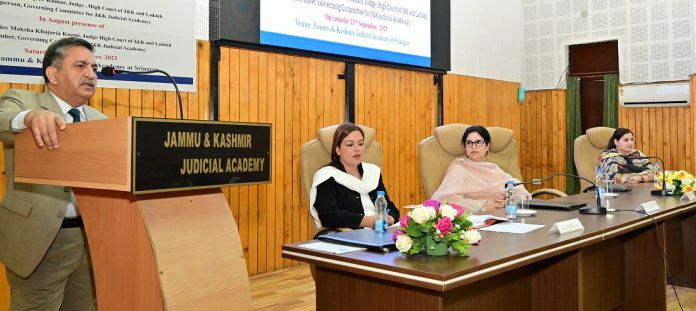SRINAGAR: In an effort to foster a more inclusive and equitable judicial system, the Jammu & Kashmir Judicial Academy organised Gender Sensitization Workshop for Judicial Officers (DLSA Secretaries), members of Gender Sensitization and Internal Complaints Committee, High Court of J&K and Ladakh, members of Gender Sensitization and Local Complaints Committees of Kashmir & Ladakh today at J&K Judicial Academy, Mominabad, Srinagar.
The workshop aimed to raise awareness and provide essential insights into gender-related issues and the challenges faced by women in the legal sphere. By sensitizing judicial officers and committee members, the program sought to create a more inclusive and gender-sensitive judicial system in Jammu & Kashmir and Ladakh.
The training programme was inaugurated by Justice Sanjeev Kumar, Judge High Court of J&K and Ladakh and Chairperson, Governing Committee J&K Judicial Academy in presence of Justice Moksha Khajuria Kazmi, Member, Governing Committee for J&K Judicial Academy. Besides, Dr. Shazia Malik, Assistant Professor, Head of Centre for Women Studies and Research, University of Kashmir and Gulafroz Jan, Assistant Professor, Department of Law, Central University of Kashmir, who were the resource persons. Proceedings were conducted by Farhana Ali, Joint Registrar, J&K Judicial Academy. In her introductory remarks, she extended warm welcome to the Dignitaries, guests and participants.
Delivering the inaugural address Justice Sanjeev Kumar stated that this workshop represents a significant step towards fostering gender sensitivity within the judicial community and promoting the principles of justice, equality, and fairness for all. Renewed efforts are being taken in bringing gender equality. We need to understand what gender is and how it is different from sex.
Justice Sanjeev Kumar said that Gender is used to describe those practices of men or women which are socially determined in contrast to those which are biologically determined. As per professor Ann Oakley a well known British Sociologist “Sex” refers to the biological division into male and female; “gender” to the parallel and socially unequal division into femininity and masculinity.” Ann Oakley introduced the term sociology of Gender and developed sex-role theory to argue that there are distinct gender roles that come from culture rather than biological differences between men and women. It is expected that the insights gained from this workshop will contribute to a more inclusive legal system in the region.
Justice Moksha Kazmi in her special address stated that in a world striving for equality and justice, it is crucial that those in the field of law, who are tasked with upholding these principles, understand the importance of gender sensitization. Gender sensitization is not a mere buzzword or a fleeting trend. In the legal profession, where the interpretation and application of laws are paramount, gender sensitization holds particular significance.
Justice Moksha Kazmi said that let us pledge to be champions of gender sensitization, not just in our profession but in our communities and homes as well. Only then can we truly say that justice is not just blind but compassionate, fair, and truly reflective of the diverse society we live in.
The first technical session was chaired by Dr. Shazia Malik, who analysed Social Construction of Gender and Gender Roles, Gender Issues, Stereotypes & Prejudices and Gender Concepts. Finally discussed Key issues on Protection of Women from Gender bias/Violence.
The second technical session was chaired by Gulafroz Jan, wherein she deliberated upon the Gender Sensitization in Crimes against Women, Eliminating Social Bias and related Judicial Pronouncements. Also discussed Role of In house Committees, Women & Law.
The programme was concluded with vote of thanks by Joint Registrar J&K Judicial Academy and highlighted that gender sensitization is not just a concept but a vital necessity for a fair and just society.


